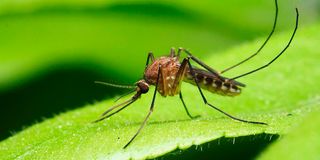Study: Younger mosquitoes bite inside, older ones outside

KemriI detected a new dangerous mosquito vector in Kenya on December 22, 2022.
What you need to know:
- The study also found out that the level of biochemical insecticide resistance was higher in the indoor resting vector populations compared to outdoor populations.
- Malaria morbidity and mortality are still of global concern with more emphasis on the Sub-Saharan Africa regions. Management has been through drug therapies and integrated vector management strategies
Majority of younger mosquitoes prefer resting indoors while older ones rest outdoors, a study has shown.
The study by the Kenya Medical Research Institute (Kemri) also found that the level of biochemical insecticide resistance was higher in the indoor resting vector populations compared to outdoor populations.
“The majority of younger mosquitoes preferred to rest indoors while older mosquitoes preferred to rest outdoors in a typical insecticide (LLIN) use scenario; with biochemical insecticide resistance higher in the indoor resting vector populations compared to outdoor populations,” says the study.
The study titled “Resting Behaviour Of African Malaria Mosquitoes In an Era Of High Indoor Insecticide Use’ sampled mosquitoes from Kisumu (Kisian) and Bungoma (Kimaeti) counties in Western Kenya.
A sampling of resting mosquitoes was carried out indoors and outdoors. The physiological ages of the mosquitoes from respective resting locations were examined using ovarian dissections for parity and the number of egg-laying cycles. Mark-release-recapture experiments were conducted to investigate the plasticity of resting behaviour in indoor and outdoor resting malaria mosquitoes in a typical LLIN use scenario within a semi-field set-up (malaria sphere).
The status and intensity of insecticide resistance were evaluated together with the Plasmodium sporozoite infectivity in indoor and outdoor-resting mosquito populations
The study presented during the 13th Kemri Annual Scientific and Health Conference sought to understand the resting behavioural responses in this era of high indoor insecticide use.
“Malaria morbidity and mortality are still of global concern with more emphasis on the Sub-Saharan Africa regions. Management has been through drug therapies and integrated vector management strategies,” said Dr Kevin Owuor, a researcher at Kemri and author of the study.
He said the backbone of vector control is insecticide use in nets and indoor residual spraying (IRS) , which are representations of powerful tools for controlling malaria vectors in sub-Saharan Africa.
“The success of these interventions relies on their ability to inhibit indoor feeding and the resting of mosquitoes. The study is fundamental to the development of novel tools for their control, and the prevention of pathogen transmission,” said Dr Owuor.





